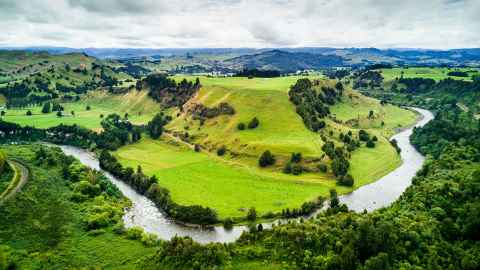Making waves: Marsden success for Arts
10 November 2020
How can we restore our river communities to health? How do we define life itself? What motivates Māori electoral choices? And how has one in three Kiwi adults become obese?

These questions are behind four projects from the University of Auckland’s Faculty of Arts to receive a total of $1,770,000 in funding from Te Pūtea Rangahau a Marsden, the Marsden Fund.
Distinguished Professor Dame Anne Salmond, Dr Dan Hikuroa (Te Wānanga o Waipapa) and Dr Billie Lythberg (Business School) have been awarded $870,000 for Let the River Speak, a project which drew inspiration from the 2017 Te Awa Tupua (Whanganui River) Act, in which Aotearoa New Zealand became the first nation-state to recognise the river as a legal person.
Based on a pilot study of rivers across New Zealand, including the Waimatā River in Gisborne, Dr Hikuroa and Professor Salmond say the project is looking for new ways to give rivers a voice and to revitalise them as living communities of landscapes, plants, animals and people.
“It’s designed to foster globally innovative exchanges across different disciplines and ways of thinking, iwi, local and central government, farmers, foresters, riverside residents, businesses and those who paddle, row, fish and swim in the river,” they say.
It’s outcome will be a range of practical interventions aimed at restoring river communities to a state of ora – prosperity, health and wellbeing.
The difference between living and non-living things has been debated since antiquity, and still confounds scientists and philosophers.
Philosopher Dr Emily Parke’s $300,000 Fast-Start project asks the biggest question of all: what is life? With more than 100 proposed definitions and “no movement towards consensus, it’s a debate that has arrived at a bit of an impasse”, she says.
“The difference between living and non-living things has been debated since antiquity, and still confounds scientists and philosophers. I will develop a novel analysis of this debate which more naturally reflects the varied roles for the concept of life in scientific practice.”
Dr Parke’s account will resolve sticking points in philosophical debates about life and scientific concepts more broadly, and will inform theoretical and empirical work in scientific fields where life matters, such as astrobiology and origin-of-life research.
With associate investigator, Dr Dan Hikuroa, Dr Parke will also take the philosophical discussion in new directions, as a lens through which to examine the relationship between indigenous and scientific knowledge.
I want to find out why Māori make their electoral roll choice, and my findings will inform debate about the future of these electorates.
Political scientist Dr Lara Greaves receives a $300,000 Fast-Start grant to look at the seven Māori electorates and why people of Māori descent choose to either vote on the Māori or general roll.
Her qualitative survey research will ask: do Māori see the electorates as a means of asserting Māori sovereignty (rangatiratanga), as a legacy of colonial rule (repression) or do people choose the Māori or general roll for other reasons altogether?
“I want to find out why Māori make their electoral roll choice, and my findings will inform debate about the future of these electorates, and help ensure effective political representation for Māori, and Indigenous peoples worldwide,” she says.
New Zealand’s legacy of colonisation and close relationship with the Pacific Islands make it a novel case study within the global rise of obesity.
And historian Dr Jessica Parr has a $300,000 Fast-Start grant to look at the historical causes of obesity in Aotearoa New Zealand, which ranks third in OECD adult obesity rates, attracting the term ‘epidemic’.
“The social complexities underlying obesity in this country become further entangled by our stark differences in obesity rates, with Māori and Pacific populations showing the highest rates,” she says, noting that New Zealand’s legacy of colonisation and close relationship with the Pacific Islands make it a novel case study within the global rise of obesity.
Dr Parr’s project will examine the historical trajectory of the proclaimed epidemic by bringing together the voices of people involved with creating and disseminating popular narratives around obesity, with medical developments, industry interests and social changes in New Zealand from 1945 to the present.
About the Marsden Fund
- In total, the 2020 Te Pūtea Rangahau a Marsden, the Marsden Fund,
has allocated $84.751 million to 134 research projects across Aotearoa in the humanities, sciences, maths, social sciences and engineering. - It is managed by Royal Society Te Apārangi on behalf of the government.